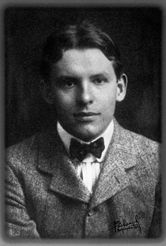 Wallace Stevens, one of the greatest American poets of the twentieth century, lived in Hartford from 1916 until his death, at the age of 75, in 1955. Born in Reading, Pennsylvania, in 1879, he attended Harvard College, received a law degree from New York Law School, and eventually, in 1916, took a position with the Hartford Accident and Indemnity Company. He was appointed Vice President of the company in 1932 and worked there for the rest of his life.
Wallace Stevens, one of the greatest American poets of the twentieth century, lived in Hartford from 1916 until his death, at the age of 75, in 1955. Born in Reading, Pennsylvania, in 1879, he attended Harvard College, received a law degree from New York Law School, and eventually, in 1916, took a position with the Hartford Accident and Indemnity Company. He was appointed Vice President of the company in 1932 and worked there for the rest of his life.
Throughout his successful career as an insurance executive, Stevens was also quietly publishing poetry. Although his first book, Harmonium (1923), sold few copies, it is now recognized as a landmark in modern poetry. His reputation grew with each new volume and he finally he received numerous honors including the prestigious Bollingen Prize in Poetry. His Collected Poems (1954) won both a National Book Award and the Pulitzer Prize.
The principal theme of Stevens’ poetry is the value of imagination in human life. His poems exhibit a dazzling inventiveness and variety: from the elevated diction and stately rhythms of “Sunday Morning,” which critics have compared to Shakespeare or the great Romantic poets, to the inventive wordplay of “The Emperor of Ice-Cream,” the bleak objectivity of “The Snow Man,” the meditative abstraction of “The Auroras of Autumn, and the transparent beauty of “Final Soliloquy of the Interior Paramour.” Critic Harold Bloom has called Stevens “a central American poet, the best and most representative of our time.”
In 1964, The University of Connecticut established its Wallace Stevens Program, sponsored by The Hartford Financial Services Group, Inc., to celebrate Stevens’ achievement and legacy. Each year the program brings to Storrs and to Hartford a poet of national or international reputation. Visiting speakers have included Marianne Moore, Robert Lowell, Allen Ginsberg, Elizabeth Bishop, John Ashbery, James Merrill, Adrienne Rich, Stanley Kunitz, and Derek Walcott. – Glen MacLeod